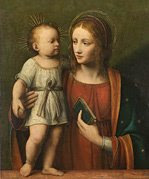Bringing School Home
Three representatives of the Seton Catholic Home Studies School were in Rome to present to members of the Roman Curia the home schooling program which provides original course material for all grade levels, standardized testing and 24-hour academic help lines.
Mary Kay Clark, director of the program, told me that what began in 1975 with fewer than 100 children, has grown into an international phenomenon with 11,000 students regularly enrolled, while servicing another 17,000 each year who utilize the materials produced by Seton.
"We grew by leaps and bounds," said this home schooling mother of seven, and grandmother of 30.
One of the main attractions to the Seton program is the fact that the pace of the lesson can be adjusted for the individual.
According to Clark, "children also tend to be able to focus a lot better as each person learns with a different capability and at varying levels, so that a child in sixth grade who is stronger or weaker in a subject can be directly catered to with a suitable adjustment in curriculum."
Critics of home schooling say that while home-schooled children may be learning more in less time, they fall behind in social skills.
Virginia Seuffert, who home-schooled her 12 children, says that actually the children have more time and energy for after-school activities such as sports, dance or music lessons. In this environment they are able to interact with other children and make friends.
Additionally, Seuffert pointed out that the children taught at home do interact with other children, their brothers and sisters.
Catherine Moran, president of the Catholic Home School Network of America, says that another positive point is that the parents have more control over the influences surrounding their children. "Unfortunately often in our modern Western cultures, children are forced to grow up too soon. They're exposed to influences at a very early age," she said.
The Seton program is also specifically Catholic encouraging a greater spiritual dimension to learning. According to Clark, in each of the over 100 text books produced by the Seton group, there is a Catholic reference.
"Take our English books for example -- if we are working on phrasing or vocabulary we might talk about a sacrament. If there is a history project, we might go back to medieval times and discover St. Joan of Arc.... Science, on the other hand, will obviously take things from a Catholic bioethical perspective," she said.
And for those parents who are concerned as to whether they're up to the academic task to respond to the needs of their children, these experts have an answer.
While both Clark and Moran have their PhD's, Seuffert is proof that the academic past of a parent should not be a limitation.
"I have a high-school diploma," she said, "but the Seton format is mom and dad-friendly, providing us with great materials and on-line counselling … we even learn with the children. It's very rewarding for the whole family."
These parents support their work with a quote from Pope John Paul II in his letter to families: "Parents are the first and most important educators of their own children and they also posses a fundamental competence in this area; they are the educators because they are parents."
* * *
Catherine Smibert can be reached at catherine@zenit.org.
Here's another article from Catholic Online: Leaders of the Home School Movement Update Vatican Officials.








 Stumble It!
Stumble It!
No comments:
Post a Comment